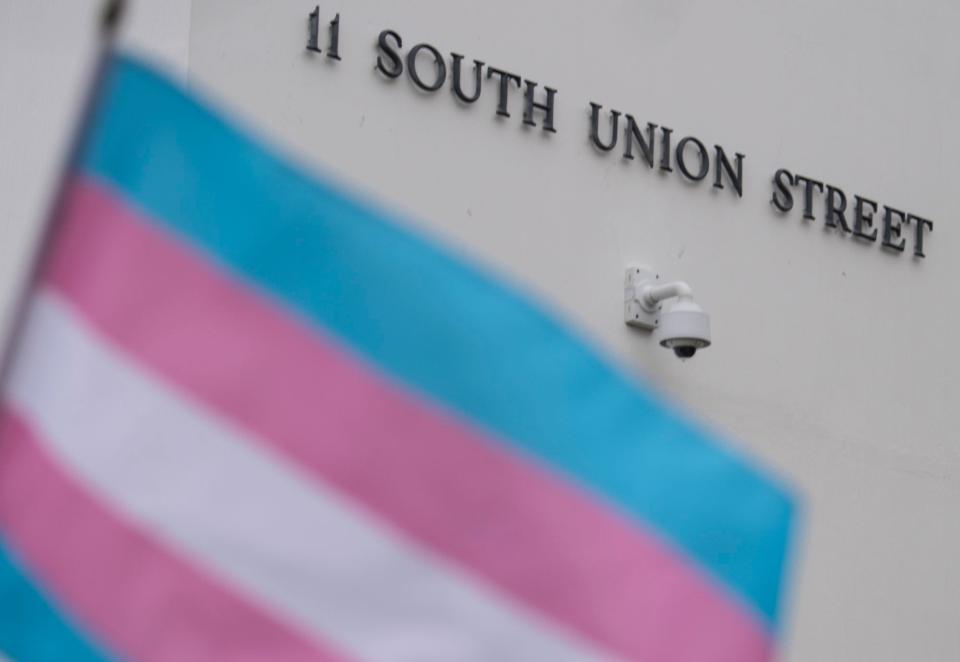Appeals court lifts injunction against Alabama’s ban on medical care for transgender youth
- Oops!Something went wrong.Please try again later.
A federal panel Monday allowed Alabama’s ban on medical care for transgender youth to go into effect, reversing a injunction from a lower court judge issued last year.
“The plaintiffs have not presented any authority that supports the existence of a constitutional right to ‘treat [one’s] children with transitioning medications subject to medically accepted standards,’” said the opinion from U.S. Circuit Judge Barbara Lagoa of the U.S. 11th Circuit Court of Appeals. “Nor have they shown that (the law) classifies on the basis of sex or any other protected characteristic.”
U.S. District Judge Jean-Paul Boulee joined the opinion. U.S. Circuit Judge Andrew Brasher, a former Alabama solicitor general, concurred in the ruling in a separate opinion. All three were appointed by former President Donald Trump.
More: Gov. Kay Ivey signs ban on transgender college athletes
Alabama’s 2022 ban makes it felony, punishable by up to 10 years in prison, for a physician to prescribe puberty blockers or hormones to a person under the age of 19. The law also bans genital surgeries on minors, which medical professionals repeatedly stressed were not performed in Alabama. A group of families and people who worked with transgender youth sued the state shortly after passage, saying the ban would harm their children’s lives.
Alabama Attorney General Steve Marshall said in a statement Monday that the ruling reinforced the state’s authority to “safeguard the physical and psychological wellbeing of minors, even if the United States Attorney General and radical interest groups disapprove.”
“Alabama takes this responsibility seriously by forbidding doctors from prescribing minors sex-modification procedures that have permanent and often irreversible effects,” the statement said. “This a significant victory for our country, for children, and for common sense.”

The Southern Poverty Law Center, the National Center for Lesbian Rights, GLBTQ Legal Advocates & Defenders, and Human Rights Campaign, representing the plaintiffs in the case, called the decision “deeply disappointing” and in conflict with prior decisions by the 11th Circuit and U.S. Supreme Court decisions.
“Our clients are devastated by this decision, which leaves them vulnerable to what the district court—after hearing several days of testimony from parents, doctors, and experts—found to be irreparable harm as a result of losing the medical care they have been receiving and that has enabled them to thrive,” the statement said. The groups said they would continue to fight in court.
The plaintiffs in the case include families of children receiving gender affirming care.
The opinion comes after Tennessee’s ban on care went into effect earlier this year, and after a federal judge blocked a similar ban on hormone therapy in Georgia on Sunday.
U.S. District Judge Liles Burke, a Trump appointee, blocked the medication ban last year after a hearing in the spring where physicians and those who worked with transgender youth said the treatments were safe and critical to their well-being.
“The record shows that at least twenty-two major medical associations in the United States endorse transitioning medications as well-established, evidence-based treatments for gender dysphoria in minors,” Burke wrote.
More: 'We matter': Protest against anti-LGBTQ legislation sweeps across downtown Montgomery
Lagoa wrote that previous due process cases do not establish a “fundamental right” to gender affirming care.
“Those decisions applying the fundamental parental right in the context of medical decision-making do not establish that parents have a derivative fundamental right to obtain a particular medical treatment for their children as long as a critical mass of medical professionals approve,” the judge wrote.
Lagoa also cited the U.S. Supreme Court’s decision in Dobbs v. Jackson Women’s Medical Center, where Justice Samuel Alito wrote that the 14th Amendment to the U.S. Constitution does not protect any right “not deeply rooted in the nation’s history and traditions.” The attorney general’s office cited the ruling in appealing Burke’s ruling, which came before Dobbs.
Dr. Morissa Ladinsky, an associate professor at the University of Alabama Birmingham who works with transgender children, said in a statement Monday that she knows firsthand the challenges trans young people and their families face and the benefits these treatments provide to youth who need them.
Gender-affirming care is “safe, effective and established medical care,” the statement said. “It is encouraging that so far, every single court that has heard directly from the doctors, parents, and experts involved in this care has recognized that the fears and misconceptions underlying these laws have no basis in reality.”
Alabama Reflector is part of States Newsroom, an independent nonprofit website covering politics and policy in state capitals around the nation.
This article originally appeared on Montgomery Advertiser: Court allows Alabama ban on medical care for transgender youth

